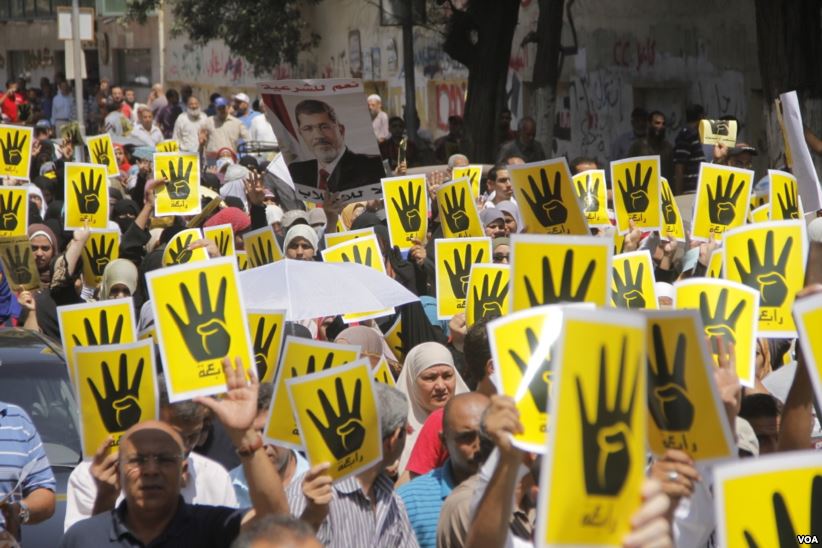 H. Elrasam / VOA
H. Elrasam / VOA
Designating the Muslim Brotherhood
Advisors in the White House are reportedly contemplating an order that would see the Muslim Brotherhood designated as a foreign terrorist organization under the material support statutes. This is part of an ongoing effort by those who view the Brotherhood as a threat to U.S. national security and have advocated for the group’s designation for some years now.
Advocates for the designation have been more vocal about the issue since the establishment of the new administration. Just last month, Senator Ted Cruz reintroduced a bill to the senate floor that “urges the U.S. Department of State to designate the Muslim Brotherhood as a foreign terrorist organization.”
In his Senate confirmation hearing, Secretary of State Rex Tillerson referred to the Brotherhood as an agent of radical Islam, stating, “The demise of ISIS will also allow us to increase our attention on other agents of radical Islam like al Qaeda, the Muslim Brotherhood and certain elements within Iran.”
The Trump administration has shown clear interest in pursuing designation of the Brotherhood, but Middle East experts and counterterrorism analysts have warned of possible risks that designation may carry.
The Muslim Brotherhood was founded in Egypt in 1928, and partook in violence in its early stages before fully renouncing such acts in the 1970s. Currently, the Brotherhood enjoys widespread support across multiple Muslim majority countries, each containing political parties that trace their origins back to the Brotherhood.
When asked about the issue, Press Secretary Sean Spicer said that the first step is, “understanding, knowing, and proclaiming who the enemy is.” These steps are indeed important, but the proposed designation shows little sign of having gone through these motions.
To begin with, the Muslim Brotherhood operates in a number of countries, each with its own offshoot branch of the organization. These branches function independently within their respective countries, with each chapter reacting to local conditions as they deem fit. Placing these different groups under the same label would run the risk of incorrectly targeting groups that would otherwise not be affiliated with terrorist activities.
It is important to note that some offshoots of the Brotherhood, most notably Hamas, continue to carry out violent attacks. Most chapters have renounced the use of violence, including the birthplace of the movement, Egypt. Rather than designating the entire Muslim Brotherhood as a terrorist organization, many countries choose to designate the local chapter of the Brotherhood if it engages in violence.
At an event hosted by the Program on Extremism at the George Washington University, Sir John Jenkins echoed these sentiments, labeling the issue “Too complex to solve with a simple solution”. Sir John referenced findings in his report in which he investigated the activities of the Brotherhood worldwide and inside the United Kingdom. The report concluded that the group has a problematic and complex relationship with violence, but it did not recommend a terrorist designation of the Muslim Brotherhood in the UK.
Designation more importantly risks undermining U.S. efforts to fight terrorism. Many Muslims domestically and abroad would view this move unfavorably, potentially perceiving it as a declaration of war against non-violent political Islamists, and by extension Islam itself. This would further tarnish the U.S. image abroad, taint America’s message to the public, and prove harmful to countering violent extremism efforts.
In a published intelligence report about the topic, the CIA warned that allies in the region “probably worry that such a step could destabilize their internal politics, feed extremist narratives, and anger Muslims worldwide.” The report went on to note, “Muslims worldwide would view an MB designation as an affront to their core religious and societal values. Moreover, a U.S. designation would probably weaken MB leaders’ arguments against violence and provide ISIS and al-Qa’ida additional grist for propaganda to win followers and support, particularly for attacks against U.S. interests.”
The U.S. is also engaged in active, diplomatic ties with many legal political parties affiliated with the Brotherhood in countries like Tunisia, Jordan, Iraq, Kuwait, and Israel. Designation would raise serious questions and pose many obstacles for America’s relationships with these countries.
All in all, the U.S. must remain wary of all the possible consequences behind the policies it adopts and should ensure that these policies protect its national interests and remain consistent with the principles it would like to convey in its message to the world. A designation of the Muslim Brotherhood as a terrorist organization could ultimately damage the primary goal of preventing terrorism, as it would reduce potential avenues for political participation.





